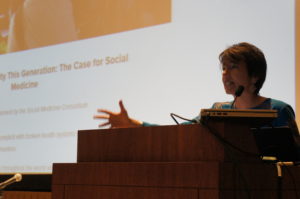Brittany Stopa is a Clinical Research Regulatory Coordinator in the BWH Department of Neurosurgery, and holds a Masters of Public Health in Global Health. She is a contributor to the BWH Global Health Hub.
Dr. Joia Mukherjee is an associate professor in the Division of Global Health Equity at Brigham and Women’s Hospital, and she has served as the Chief Medical Officer for Partners in Health since 2000. She recently published an undergraduate textbook titled, “An Introduction to Global Health Delivery.”
“In stunned silence I watched Lovely die in front of me. Her bloated belly, red hair, and swollen feet screamed the medical diagnosis kwashiorkor, protein calorie malnutrition, starvation. The heartache, anguish, and even shame on her mother’s face pierced my psyche… Children do not die of starvation because of their mothers’ ignorance. Mothers know when their children are hungry from their ceaseless cries. They know when their children are dying of starvation when the crying stops. More than 25 years ago I first witnessed death from starvation. In my youth, my ignorance, and my relative solitude, I delivered only the prescribed guidance to Cynthia, and to other mothers. But I could not make sense of a world where a starving child was not offered food. I felt ashamed then and now at the gross inequity of a world with enormous wealth and starving children. Health disparities are a thermometer of injustice.”
This introduction to Mukherjee’s new textbook from Oxford University Press, An Introduction to Global Health Delivery, sets the tone for a publication that aims to reshape the field of global health and how it is taught. In it, she calls out the established set of practices in global health as failing the people they purport to serve. And Dr. Mukherjee calls for a new approach to global health delivery, one that is built on the premise that everyone has a right to health.
From her own training in global health, through her work in resource-poor communities around the world, Mukherjee has seen first-hand the chasm that exists between what is taught in the classroom and what is needed to make a difference in health equity. She urges the next generation of global health delivery professionals to learn from the mistakes of her generation. Towards that end, she has written this compelling textbook to hopefully ensure that when a child like Lovely enters a clinic in Africa ten years from now, she will be given the comprehensive care she needs.
Mukherjee’s textbook focuses on five principles of global health delivery.
- We must deliver care to the actual burden of disease, not just the diagnoses that are convenient to treat.
- Programs should be implemented to achieve equity, and only when 100% of patients are reached can it be called a success.
- We must understand and address the social determinants of health, because they are the biggest hurdles to helping patients.
- We should develop a rights-based approach, which will necessitate involving the governments as arbiters of human rights.
- We must build capacity, because global health delivery is very much a marathon and not a sprint.
All of these principles are essential to the success of global health delivery, but we can’t achieve them if our approach is restrained by the utilitarian philosophy of efficiency over quality.
Even as recently as a few years ago, when I, myself, was a student of global health, these were not the principles we were taught. I was taught about budgeting and creating stand-alone programs that addressed a single issue. I was taught that we could utilize the free labor of community health workers, not that we should train and pay them for their work. I was taught that reporting a successful project meant stating the number of children vaccinated, not looking at the entire population to see who was missed.
I knew this couldn’t be the whole picture, so I sought out another perspective. After reading Tracy Kidder’s book about Paul Farmer, Mountains Beyond Mountains, I felt inspired. I attended a Partners in Health volunteer night, and nearly every volunteer I met there had been drawn in for the same reason. They were all MPH students who wanted to know how they could make a real impact, even if it wasn’t easy or cost-efficient. We weren’t getting this perspective in our school programs. It seemed like some secretive approach to global health that only Partners in Health was endorsing.
The field of global health has shifted directions several times since its inception. In her textbook, Mukherjee posits that we’ve entered a new era of global health delivery, one in which the old cost-efficient model no longer applies. And as a recent student of global health, I can say with certainty that this book will be welcomed with enthusiasm by global health students. It gives them the whole truth of conducting global health. Mukherjee puts it in a historic perspective, explains what hasn’t worked and why, and shows how they can go forward into their careers to make a difference.
Mukherjee shows through her own work that taking this global health delivery approach actually works. She has been doing this work with Partners in Health in Rwanda for years, and has seen some of the steepest declines in mortality in history. For all the global health students whose hearts flutter when they hear that, this textbook is the guidance they’ll need to go out into the world and make such an impact themselves.

